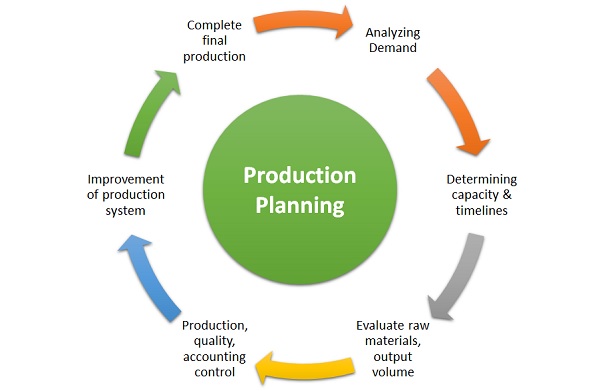- Business Concepts ›
- Operations and Supply Chain ›
- Production Planning
Production Planning
Definition, Importance, Steps & Example
This article covers meaning & overview of Production Planning from operations perspective.
What is meant by Production Planning?
Production planning is a strategic plan which manufacturers do whenever they want to produce goods. Production planning includes confirming product to be made, production volume, capacity planning, materials required, scheduling timelines etc.
This is important for manufacturers who to maximize efficiency, reduce costs & have a sustainable production cycle.
Steps in Production Planning
Some of the main steps in the production plan progress are:
1. Analyzing customer demand
Without customer demand there would be no production. If the demand is more and production is not enough then also many orders would go unfulfilled.
So the most important parameter before planning your production is that how much is the demand in the market and how much production you have to do for a profitable business.
2. Determining production capacity & timelines
Let us say the customer demand is 100 vehicles per month. The main factor here is that whether the business can meet the entire demand. It may not happen as the production capacity for the business may be 30 vehicles per month at optimum capacity utilization.
So for production planning, the business needs to focus on these 30 vehicles at highest quality and lower costs.
3. Evaluate raw materials
Raw materials form the backbone of production. Availability of raw materials can impact production planning. If even of the raw materials is not available, production department needs to re-plan and optimize the production till the raw material is available.
Even the fluctuations in the cost of raw materials need to be considered.
4. Production control, quality control, accounting
A business can't increase production to meet demands if it cannot meet the quality standards and document everything properly.
5. Evaluation & improvement of production system
Production planning is an ongoing process and needs to be constantly tweaked, improved and changed to changing demands, consumer behaviour, SKU, seasonality etc.
Regular maintenance and machine improvement also needs to considered for product planning process.
6. Complete final production of finished goods
After the production is complete, the final product needs to go more rounds of quality check and then comes the packaging with artwork which completes the production cycle. Production planning needs to take this step in account as well as it may be the most critical step in the entire production cycle.

Importance of Production Planning
This involves making a detailed production schedule. It also involves deciding from where to obtain the raw materials, how much raw materials are required, when should the resources be made available for production, planning the sequence of activities, etc.
The main aim is maximizing profits, minimizing costs and meeting the customer requirements. Production planning also aims at predicting the possible glitches in production and ensuring smooth execution of operations. Production planning can be done at three levels – factory, process and operation.
Production Planning Example
In case of a soft drink manufacture factory.
The production planning will involve:
Factory level planning
Planning the activity sequence (buying raw materials like sugar, carbonated water, etc., producing the drink, bottling, etc.)
Process level planning
Planning the operations on inputs to convert them into desired output (preparing the concentrate, mixing carbonated water, etc.)
Operation level planning
Planning each operation (what equipment have to be used, how much soft drink has to be filled in the bottles, etc.)
Hence, this concludes the definition of Production Planning along with its overview.
This article has been researched & authored by the Business Concepts Team which comprises of MBA students, management professionals, and industry experts. It has been reviewed & published by the MBA Skool Team. The content on MBA Skool has been created for educational & academic purpose only.
Browse the definition and meaning of more similar terms. The Management Dictionary covers over 1800 business concepts from 5 categories.
Continue Reading:
What is MBA Skool?About Us
MBA Skool is a Knowledge Resource for Management Students, Aspirants & Professionals.
Business Courses
Quizzes & Skills
Quizzes test your expertise in business and Skill tests evaluate your management traits
Related Content
All Business Sections
Write for Us